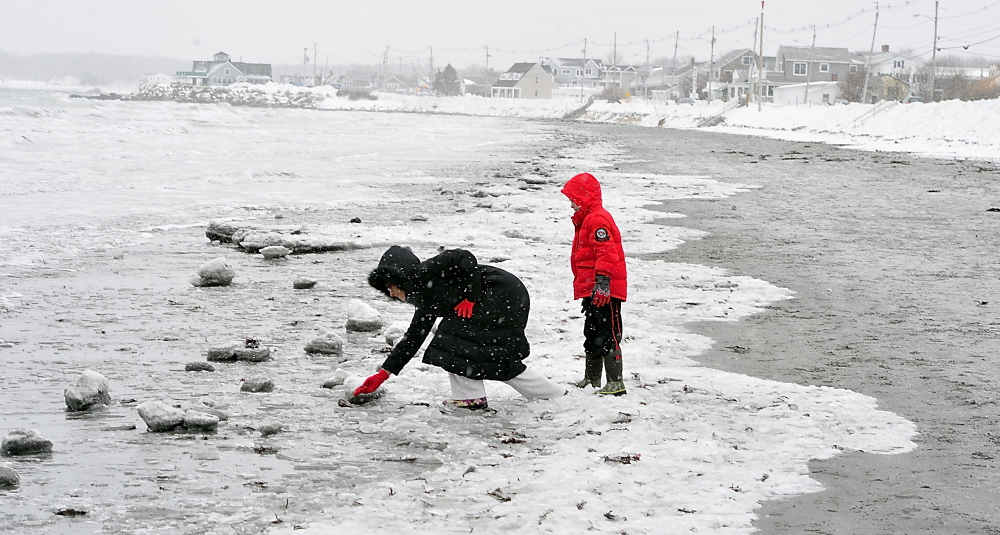A York selectman wants the town to consider buying privately owned sections of its four publicly used beaches. In Wells, selectmen were scheduled to meet Tuesday in closed session to discuss the future of beaches in that town, some of which are also under private ownership.
And the town of Kennebunkport and the state Attorney General’s Office filed motions Tuesday asking the Maine Supreme Judicial Court to reconsider a Feb. 4 ruling that has unnerved coastal communities about future public access to beaches throughout the state.
The court ruled against the town of Kennebunkport’s claim of public access to Goose Rocks Beach, meaning that private owners of beachfront land can deny the public recreational use of beach they own, stretching down to the low-water line.
Officials in nearby beach communities who were initially surprised and disappointed by the ruling are now trying to figure out what it could mean for them. With long stretches of sandy beach that draw armies of tourists each summer, the towns worry that the ruling could affect their economies as well as recreational opportunities for residents who don’t own beachfront property.
Wells selectmen, who planned to meet the town’s manager and attorney in executive session Tuesday, believed their community had established the public’s right to use Wells Beach after a similar court case in 2000. In that decision, the Maine Supreme Judicial Court supported public access to the dry-sand portion of Wells Beach and to the intertidal zone — the land between low and high tide lines.
Kennebunkport “relied heavily on (the Wells) case to build its own case,” said Amy Tchao, attorney for Kennebunkport. “It looks, for all practical purposes, that (the court) may have overturned that decision.”
As Wells officials revisit an issue they thought was behind them, York selectmen will look at preventing the issue from becoming a problem there.
Ronald Nowell, chairman of the York Board of Selectmen, plans to ask fellow town officials Monday about possibly buying privately owned sections of beaches in the town.
Nowell said there’s a mixture of public and private ownership along York’s shoreline. For example, Cape Neddick Beach is “totally private,” he said, while Short Sands is mostly publicly owned.
He said the town would have to negotiate with about 30 owners who own beach property. Nowell said he doesn’t know what it might cost the town or how to pay for it.
Rae LeBlanc, who has owned the Katahdin Inn on Short Sands Beach for 24 years, said she’s not sure where in the sand her property line ends, but she knows she wouldn’t want to sell any part of it to the town. At the same time, LeBlanc said, she has no interest in keeping people off the beach.
“Doesn’t mean people can’t walk up and down the rocks and do all that stuff,” she said.
Future property owners may not be as welcoming, and could decide to block access or post “No Trespassing” signs on beaches, despite Maine’s long tradition of property owners allowing public access to their land, Nowell said. The only way to ensure that the beaches remain accessible is for the town to own them, he said.
“All it takes is one person moving here with money,” he said.
The Kennebunkport case decided earlier this month was the latest in a series of coastal access disputes to test the high court’s interpretation of Maine’s 370-year-old “Colonial Ordinance.” The ordinance, adopted when Maine was part of Massachusetts, protects access to the state’s intertidal zone for “fishing, fowling and navigation,” but says nothing about sunbathing, swimming or surfing.
In the Kennebunkport case, the town argued that the public had effectively earned access to the beach after decades of uninterrupted use for all kinds of recreation.
A York County Superior Court ruling in 2012 supported public access, and said that hundreds of back-lot owners in the Goose Rocks Beach neighborhood, the town and the public all have the right to use the beach. The supreme court ruling this month overturned that decision.
For York residents, the implications of the supreme court ruling hit close to home. A few years ago, two landowners along the Cliff Walk, between York Harbor Beach and Roaring Rock, put up a fence to block the path from the public.
Nowell said York officials have a meeting planned with the town’s attorney to decide whether to take that case to court.
“I hope we do,” he said.
He wants to start figuring out how to avoid a similar scenario arising on a privately owned beach.
“It’s going to happen sooner or later,” Nowell said. “I never thought it would happen on the shore path, nobody did. But it has.”
The reconsideration requests filed by Kennebunkport and the Attorney General’s Office on Tuesday represent a last-ditch effort to change, or clarify, the recent ruling.
Kennebunkport’s motion says the ruling raises questions about whether the court intended to overturn the 2000 decision regarding Wells Beach, and whether it is still possible, based on this ruling, for the public to establish a historic claim to recreational access anywhere in the state. The town also asks that the case be remanded to Superior Court to decide access on a “parcel by parcel basis.”
It’s not known how much time the court will take to respond to the motion.
Leslie Bridgers can be contacted at 791-6364 or at: lbridgers@pressherald.comTwitter: @lesliebridgers
Copy the Story LinkSend questions/comments to the editors.





Success. Please wait for the page to reload. If the page does not reload within 5 seconds, please refresh the page.
Enter your email and password to access comments.
Hi, to comment on stories you must . This profile is in addition to your subscription and website login.
Already have a commenting profile? .
Invalid username/password.
Please check your email to confirm and complete your registration.
Only subscribers are eligible to post comments. Please subscribe or login first for digital access. Here’s why.
Use the form below to reset your password. When you've submitted your account email, we will send an email with a reset code.